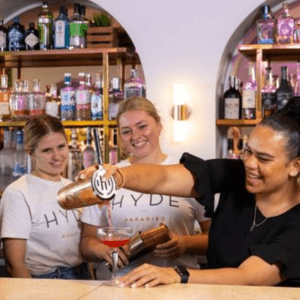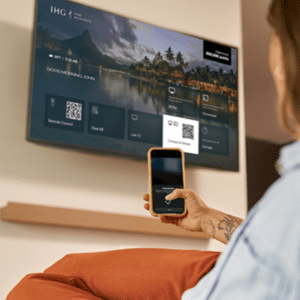 A new study from Expedia Media Solutions, the advertising sales division of Expedia, Inc., analyzes online travel content consumption and booking across devices and audience segments in the U.K., with comparisons to U.S. online traveler trends. As a significant number of U.K. households now have multiple devices in the home, there are more opportunities for marketers to reach travelers across screens.
A new study from Expedia Media Solutions, the advertising sales division of Expedia, Inc., analyzes online travel content consumption and booking across devices and audience segments in the U.K., with comparisons to U.S. online traveler trends. As a significant number of U.K. households now have multiple devices in the home, there are more opportunities for marketers to reach travelers across screens.
Commissioned by Expedia Media Solutions and conducted by comScore, the proprietary study found that nearly three-quarters (73 percent) of the 48 million people in the U.K. engaging with digital content across smartphones, tablets and PCs are interacting with travel-related content compared to two-thirds (63 percent) in the U.S.
The total U.K. travel audience in mobile is equal to that of PC, as mobile device ownership and usage continues to grow. The study further revealed that smartphone users in the U.K. are the most likely to access travel content in a given month. With these findings in mind, there is an increasing opportunity for brands to reach customers in the U.K. across smartphones, tablets and PCs.
PC usage remains high, but mobile device ownership continues to rise in the U.K. (outpacing the U.S.), pointing to the importance for marketers to employ multiscreen strategies to reach audiences across devices.
- Three of four U.K. travelers own all three types of devices – PC, smartphone and tablet – up from one of two U.K. travelers in 2014
- Nearly half of the travel audience in the U.K. engages with travel on both their PC and mobile devices each month
- Among the 25 million U.K. consumers using mobile devices to access travel content monthly, 70 percent access travel content only via smartphone; 14 percent use both smartphone and tablet
- The majority of U.K. users access all of the travel categories—including travel information, ground/cruise, hotels/resorts, online travel agents, airlines, car rental, and travel—via PC, however more than one-fourth of the total travel audience only accesses travel content through their mobile device.
Mobile devices are being used by the U.K. travel audience across all travel stages – from researching to planning to shopping to during a trip – but marketers need to understand how content engagement varies between tablets and smartphones.
- The majority of mobile users in the U.K. are engaging with travel content on their mobile devices via the browser; 66 percent of smartphone users and 81 percent of tablet users access travel content exclusively via the browser
- While the mobile browser drives the travel experience, mobile apps are still important to this audience with 21 percent of smartphone users and 10 percent of tablet users accessing travel content only through the app
- In the U.K., tablet usage is consistently leveraged across all travel stages – researching destinations (51 percent), shopping for air and hotel (41 percent), planning trip activities (48 percent) and during a trip (42 percent); the U.K. audience is much more engaged with tablets across all travel stages compared to the U.S. audience
- Mobile usage, especially on tablets, peaks during primetime while PC leads engagement throughout the workday, helping marketers understand when and where to optimally reach customers
U.K. consumers are making significantly more online purchases on tablets than they did the prior year – tablet travel transactions are following pace and are expected to increase even more in the next year.
- Over one-third (36 percent) of tablet owners in the U.K. have booked travel on their tablet while one-sixth (16 percent) have booked via their smartphone in the past six months
- When looking at different travel segments, the luxury traveler is more likely to book travel on both the tablet (64 percent) and smartphone (35 percent) than the family, budget or business traveler
- Nine out of 10 travelers in the U.K. who have booked on a tablet plan to book again, and six out of 10 travelers who have booked on smartphone plan to do so again
U.K. travelers are consuming more content across the travel category, and are more likely to browse travel content for fun, than U.S. travelers – the key for marketers is relevant and captivating experiences.
- The U.K. travel audience is more engaged than the U.S. travel audience across most of the travel category, except travel information and car rental
- In the U.K. 18 percent of mobile owners intentionally clicked on a mobile ad, primarily because they found the ad relevant to a product or service of interest or it caught their attention
- Also, 21 percent of U.K. tablet users are more likely to see and intentionally click on ads compared to 13 percent of smartphone users
- U.K. business travelers were significantly more likely to intentionally click on mobile ads than other groups, regardless of device
“Mobile adoption is showing no sign of slowing, and people are getting even savvier with how they are using tablets and smartphones for travel content consumption and booking,” said Noah Tratt, global senior vice president of media solutions at Expedia, Inc. “Using these insights, marketers can better understand U.K. travel audience behaviors across devices and better identify effective points of engagement on each device and during any stage of the of the travel experience.”
To view the full study please visit: http://bit.ly/1H7mAyg.



















